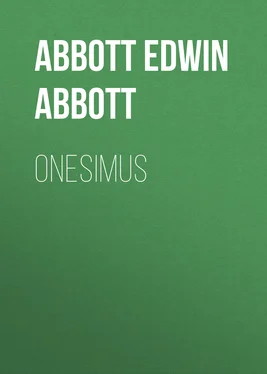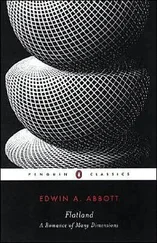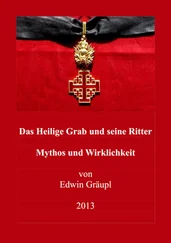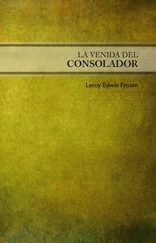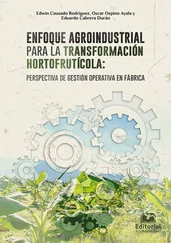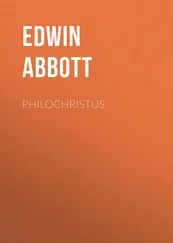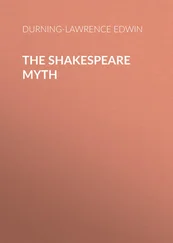Edwin Abbott - Onesimus
Здесь есть возможность читать онлайн «Edwin Abbott - Onesimus» — ознакомительный отрывок электронной книги совершенно бесплатно, а после прочтения отрывка купить полную версию. В некоторых случаях можно слушать аудио, скачать через торрент в формате fb2 и присутствует краткое содержание. Жанр: foreign_sf, на английском языке. Описание произведения, (предисловие) а так же отзывы посетителей доступны на портале библиотеки ЛибКат.
- Название:Onesimus
- Автор:
- Жанр:
- Год:неизвестен
- ISBN:нет данных
- Рейтинг книги:4 / 5. Голосов: 1
-
Избранное:Добавить в избранное
- Отзывы:
-
Ваша оценка:
- 80
- 1
- 2
- 3
- 4
- 5
Onesimus: краткое содержание, описание и аннотация
Предлагаем к чтению аннотацию, описание, краткое содержание или предисловие (зависит от того, что написал сам автор книги «Onesimus»). Если вы не нашли необходимую информацию о книге — напишите в комментариях, мы постараемся отыскать её.
Onesimus — читать онлайн ознакомительный отрывок
Ниже представлен текст книги, разбитый по страницам. Система сохранения места последней прочитанной страницы, позволяет с удобством читать онлайн бесплатно книгу «Onesimus», без необходимости каждый раз заново искать на чём Вы остановились. Поставьте закладку, и сможете в любой момент перейти на страницу, на которой закончили чтение.
Интервал:
Закладка:
§ 3. HOW NICOSTRATUS URGED THAT, WITHOUT THE BELIEF IN THE GODS, THE LIFE OF MAN WOULD BE VOID OF PLEASURE
It happened about this time that there was a great feast in honor of Artemis, and the customary processions and dances, and games also and chariot-races and plays exhibited in the theatre. Being sick at this time and not able to go abroad, Philemon besought Nicostratus to take me with him to the theatre, and to show me the pomps and shows of the festival, which far exceeded anything that I had ever seen in our little town of Lystra. So on the morning of the festival, early before sunrise, I went to the house of Nicostratus; who had no sooner saluted me than he began at once, after his manner, to take occasion of the festival to commend, in a long discourse, the belief in the immortal gods. “For seest thou not,” said he, “how to all men, poor as well as rich, slaves as well as masters, the festivals of the gods bring round brightness and gladness?” Methinks he noted that my countenance was altered when he spoke of “slaves,” for he hesitated and was silent for a moment; but anon, collecting himself, he continued cheerfully thus: “When I speak of slaves, I mean not such as thou art, being already half emancipated and rather thy master’s friend than his servant; but I mean rather the poor wretches toiling in chains or grinding at the mill, to all of whom the festival brings relief and some gleam of joy. For five days ago, before the feast began, sawest thou not how even at the approach of the holiday all was astir within the city, yea and without too; food and wine and fruits and oxen and sheep for sacrifice being brought in from the country; old garments purified and freshly decked out, new ones bought or borrowed from friends; the statues of the gods taken down and carefully cleansed and polished till they glitter.” At this point he was interrupted by a slave who had been waiting to tell him that it was time to go forth to the temple. Descending to the court-yard we found all the household awaiting us, clothed in their best attire, the little children bearing frankincense in their hands and the victims adorned for sacrifice. Regarding them all with a glad countenance and saluting many of them by name, Nicostratus bade me remember that at this same moment every householder in Colossæ, however austere or miserly by nature, was constrained by the observance of the gods to go forth in like manner to offer sacrifice. “And now,” continued he in an unbroken discourse, “we shall all go to the great temple. Prayers will be offered up; none but words of good omen will be uttered; no sound of quarrel or abuse or even of ribald mirth will be heard in the whole of the vast assemblage. After this, some offer sacrifice; the rest stand by as spectators. Then begins the feasting, some feasting in the temples, others at home where you and I will make merry together. And as for the rest of the day and the days following, thou shalt see how pleasantly they will pass. Yet all this is but a copy of that which happens at every festival in every city where the gods are rightly reverenced. For during the feasting, the whole city resounds with singing, some chanting hymns in honor of the god, others odes and songs, serious or merry, according to each one’s pleasure. I omit to speak of the processions and shows, all full of beauty and delight, but not more beautiful here than in a thousand other cities of Asia and Europe.”
Here he broke off, to salute some of his acquaintance. “Hail, Charicles! and you, too, Charidemus! I rejoice to see you in the city, and forget not that to-morrow you are bespoke to dine with me.” Then turning again to me, “Note, I pray you,” said he, “how all the people, both citizens and country-folk, are knit together in concord on such days as these. For there is scarce one citizen in Colossæ but has invited some stranger or some acquaintance from the country to partake of his good cheer. Amid the drinking old friendships are drawn closer, new friendships are begun. After dinner some show strangers about the city; others sit down in the market-place and talk pleasantly together. Throughout the day no law courts are open, no execution is allowed, no debtor need fear arrest, no slave dreads the lash; all quarrel, all strife receives at least a cessation, which sometimes brings about a permanent peace. In the evening the feasting begins again, and all sit down to sup; so many are the torches that the whole city is filled with light; each street resounds with the flutes and the joyful songs of the revellers. Austere sobriety is laid aside for once, and to drink a little to excess in honor of the gods is esteemed no great disgrace. Thus for three days the feast continues; and when it is over we part with vows of friendship, in peace and good will, praying that we may live long enough to see such another feast come round again. Now,” concluded Nicostratus, “take away the gods from out of the world and what cause remains why men should thus meet and rejoice together? For where there are no gods, there are none to be thanked, and therefore no thanksgiving; but thankfulness is the salt of life. Whosoever therefore takes away the gods from the life of man takes away the prime cause of human joy, and must be esteemed the enemy of all mankind.”
I felt in my inmost mind that a keen and subtle disputant, such as Artemidorus, might have had much to urge against these arguments of Nicostratus; yet at that time many things joined together to incline me to accept his reasonings. For having been now nearly a year at Colossæ I had received on all sides such tokens of good will, and I may almost say of affection, as had already well nigh won me out of my first condition of distrust; and although it were not according to reason to argue that whatsoever things are pleasant must needs be also true, yet did it appear beyond doubt that life without the gods would be full of dullness and gloom, all men being everywhere wholly given up to cares and self-searchings. And I reasoned thus with myself, “If indeed there be gods, then it were wrong not to acknowledge them; but if there be no gods, why even then it seems happier to believe that gods exist, and, in that case, how can ‘no gods’ deem belief in gods to be a sin?” So for my part, being at that time recovered from my melancholy, and young, and in good health, and taking pleasure in the pride of life and the pleasure of the flesh, I concluded to take the happier side and to believe that there were gods ruling the world to good ends.
§ 4. HOW PHILEMON, FALLING SICK, INCLINED TO SUPERSTITION
About this time Philemon falling sick, turned to a melancholy, and becoming wholly changed from his former disposition, gave himself up to all manner of superstitions. Resorting in vain to all the physicians of the place, he was led at first to try charms and amulets, and then to consult soothsayers and astrologers and the priests of strange gods; and thus, little by little, partly by the burden of his disease enfeebling his understanding, and partly by reason of the company which he now frequented, he became daily more timorous and superstitious. He offered sacrifice almost every day, and anxiously awaited the report as to the entrails; he resorted often to the priests of all kinds of gods more especially Isis, Serapis, and Sabazius, and sometimes he would invite them to his own house, so that our house became a kind of temple in Colossæ; he purified himself many times a day both with the lustral waters and with other strange purifications; he would wear naught but linen, and abstained from many kinds of flesh, and in the end from all flesh; if he saw a sacred stone he would fall down on his knees before it and anoint it with oil. Nay, once, during this melancholy fit of his, when we had set out after much preparation upon a journey to Ephesus, the sight of a weasel—though we were now fully a mile past the city gate—made him turn back and give up the journey altogether. At last, when no remedies and no charms availed anything, supposing himself to be under the special displeasure of some unknown god, he took to his bed and could not be persuaded to leave it.
Читать дальшеИнтервал:
Закладка:
Похожие книги на «Onesimus»
Представляем Вашему вниманию похожие книги на «Onesimus» списком для выбора. Мы отобрали схожую по названию и смыслу литературу в надежде предоставить читателям больше вариантов отыскать новые, интересные, ещё непрочитанные произведения.
Обсуждение, отзывы о книге «Onesimus» и просто собственные мнения читателей. Оставьте ваши комментарии, напишите, что Вы думаете о произведении, его смысле или главных героях. Укажите что конкретно понравилось, а что нет, и почему Вы так считаете.
